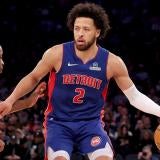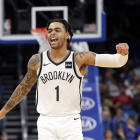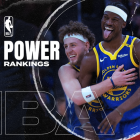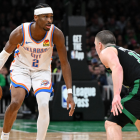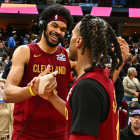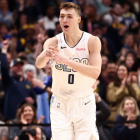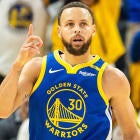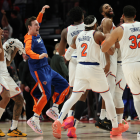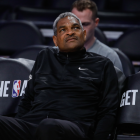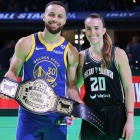Mere hours after seemingly losing Kevin Durant to the Nets for nothing, the Golden State Warriors pulled off perhaps the biggest early free agency shocker that we've seen by reportedly turning the Durant deal into a sign-and-trade with Brooklyn for D'Angelo Russell, Treveon Graham and Shabazz Napier -- the latter two of which Golden State has since moved to Minnesota.
Russell was obviously the center of the deal anyway, and the Warriors are reportedly getting him on a four-year, $117 max deal. At first glance, Golden State is getting a young All-Star for a player in Durant that they were going to lose for nothing anyway, and there's definitely some level of truth in that gravy outlook. But it's much more complicated than that.
Russell is definitely not gravy. In more ways than one, Golden State is paying a hefty price for him. A lot of chatter around the league suggests that the Warriors do not intend to keep Russell long-term, and are in fact more interested in his value as a flip on the trade market. We'll see if there are any takers for the contract Golden State just gave Russell once this free agency period dries up. They can't trade him until December 15th regardless.
Again, this was not a pure gravy move for a player the Warriors were going to lose anyway. It was spendy. It was risky. There are still ways it can work out whether Russell stays or goes, but there's a lot to this conversation. So let's have the conversation, shall we?
With the information we have as of now, here is everything you need to know about what this reported deal means for the Warriors, both in the short and long term.
Young talent over depth, flexibility
It's true, the Warriors had basically no means to land the type of talent Russell is, at his age, without pulling off this deal. They have no cap room. No young assets to trade. They're too good to get a significant draft pick. So they make the move for Russell and they worry about the fit later, if they even keep him at all but it does cost them.
For starters, they already had to deal Andre Iguodala to Memphis to make room for Russell's salary. They also had to send a 2024 first-round pick to the Grizzlies, and they sent another future first-round pick to Brooklyn to get them to do the deal in the first place, and for a team with very little flexibility as it is, first-round picks, even ones in the 20s, have real value on the market.
Not insignificant: The Warriors do get a $17 million trade exception for the Iguodala move. They can't use that money this year, but for a team with no cap room in the future, it will come in really handy starting next summer.
Beyond that, this deal is probably going to cost the Warriors virtually their whole bench from last year. Why? It's all about the hard cap.
Without getting too deep into salary cap complexities, here's the gist: Before this deal, as a team over the salary cap, the Warriors could've effectively spent as much money as their owners' stomachs, and wallets, could've handled to re-sign their own players, as the regular cap only serves to restrict you from adding outside players. But after executing this sign and trade, the Warriors are now "hard capped" at just under $139 million next season.
A hard cap is exactly what it sounds like -- a HARD cap. You can't exceed it under any circumstances, even for your own players. That $139 million is a final number, and look at what the Warriors have committed to just three players:
The price of the Warriors backcourt next season
— Anthony Slater (@anthonyVslater) July 1, 2019
Steph Curry: $40.2 million
Klay Thompson: $32.7 million
D'Angelo Russell: $27.2 million
Total: $100.1 million
Add in Draymond Green's $18.5 million next season, and the $6 million combined in the already-on-the-books contracts of Alfonzo McKinnie, Damian Jones and last year's first-round pick Jacob Evans, and the $5 million oer season they just paid to retain Kevin Looney (a great three-year deal for Golden State), and the Warriors have about $10 million to pay about six more players to fill out the team. Do the math, and that's basically $2 million per player on average.
In all likelihood, that means bye-bye to DeMarcus Cousins and probably Quinn Cook, both of which will command more than that on the open market. Shaun Livingston is almost certainly gone, too, whether by retirement or the Warriors waiving his non-guaranteed salary. Jordan Bell has already moved on to Minnesota. Again, Iguodala is already gone.
So you see: Russell was far from free. The alternative was to let Durant walk for nothing and try to resign some of those players we just mentioned. The Warriors obviously believe Russell is better than any of those players (which he is) and is also more valuable than any of them on the trade market. So they made the move. But it cost them depth, flexibility, and if their plan is to ultimately trade Russell, there's no guarantee anyone will want him on that max contract they just gave him.
About that ...
What would Russell's value be in a flip trade?
For starters, as mentioned above, the Warriors can't trade Russell until December 15th at the earliest, per CBA rules on newly signed players. So they're going to play with him for at least a few months, and likely longer. Perhaps they try to move him at the February trade deadline, once Thompson is closer to coming back.
This could go one of two ways: Next to Stephen Curry, in all that space he provides, Russell could thrive and look even better than he did last season when he became an All-Star, and in doing so, look even more attractive as a trade asset. Or, he could struggle to find his way as a guy used to having the ball in his hands ALL THE TIME playing as a cog in a much bigger wheel, and in the shadow of Curry, and look a lot worse than he did in Brooklyn.
If the latter happens, there are not going to be a ton of teams lining up to take on Russell on a max contract. Who might some of the interested teams be? First and foremost, everyone knows the Wolves want Russell. The point guard market has pretty much dried up and the Wolves still don't have one they want to move forward with. Golden State would likely be interested in a move that would bring them, say, Robert Covington as a centerpiece.
But outside of Minnesota, who's going to take on Russell? Phoenix got its point guard in Ricky Rubio. Same for the Pacers with Malcolm Brogdon. The Knicks are committed to keeping their books clean until at least 2021 when Giannis Antetokounmpo hits the free agent market. The Lakers are trying to put together a super-team and feel very close to doing so with Kawhi Leonard.
Start going down the list, and there is likely a very limited, and specific, market for Russell. If the Warriors can't tap into that market, they could well be married to Russell for a while, whether that was their primary intention in trading for him or not.
So then, how does Russell fit with Warriors?
He can score big. He can shoot off the dribble and the catch. He can pass. In the right situation, he's an All-Star offensive player, but the situation with the Warriors will be far different from the one in which he was operating with Brooklyn, which gave him the ball and let him freelance his heart out in a fast-paced, super-spaced system.
The Warriors will offer a relatively fast pace. And nobody provides space like Curry. But Russell is a pick-and-roll player, almost exclusively. In fact, he nearly ran more pick and rolls last season than the entire Warriors team combined, and he's not going to get those same opportunities in Kerr's system, which doesn't even give regular pick-and-roll opportunities to Curry, who might be the best pick-and-roll player in history.
Heard enough about pick and rolls?
Well, get used to it, because either Kerr is going to bend his system to accommodate Russell and make him look as good as possible for a potential trade, or Russell is going to have to basically completely recreate his offensive existence inside what the Warriors do.
Still, from a pure firepower standpoint, Russell helps. Again, he can get and create buckets. He can shoot. At least while Klay is out, he makes it so the Warriors don't have to completely tax Curry and Draymond to stay afloat in the playoff race. Who knows -- maybe Russell's breakout last season wasn't system-and-opportunity specific and he has another step in him, and maybe he and Curry will thrive together as a super-duper run-and-gun tandem, in which case Thompson could come back and play the three with Green at the four and the Warriors could just try to score 130 points a night.
But they'll definitely have to score, because the defense takes a major hit here. With Iguodala and Durant gone, and with Looney likely not far from following them out the door, and with Thompson on the shelf, the Warriors will be going into next season without four of their best defenders from last season, and they were already trending in the wrong direction defensively.
Russell is a bad defender, plain and simple. He has the length to look fine on paper, but he just doesn't give the effort or have the instincts to qualify as anything north of a defensive neutral. On most nights, he's a minus.
In conclusion ...
At the end of the day, the Warriors made a move for Russell that perhaps they felt a little pressured into making after losing Durant while facing the prospect of entering the new Chase Center without any excitement attached. Did they get ahead of themselves in committing so much to Russell? We'll see how he looks, and if it's good enough to either justify the money they gave him and the bench pieces and flexibility he cost them, or to fetch them a package on the trade market more befitting their system and personnel.
But that's all speculation. Right now, the Warriors have Russell. And his money. And all the strengths and weaknesses he brings. And that will be true until at least December 15th. From there, we'll see.
![[object Object] Logo](https://sportshub.cbsistatic.com/i/2020/04/22/e9ceb731-8b3f-4c60-98fe-090ab66a2997/screen-shot-2020-04-22-at-11-04-56-am.png)






